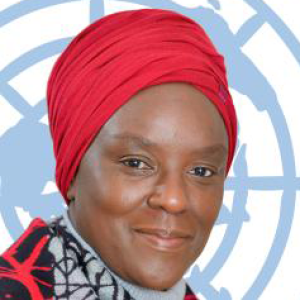I Pay My Respects to His Majesty King Letsie III,
The Right Honorable Prime Minister, Dr. Moeketsi Majoro
Honorable President of Senate,
Honorable Speaker of The National Assembly,
His Lordship The Chief Justice,
His Lordship President of The Court of Appeal,
Honorable Deputy Prime Minister,
Honorable Members of His Majesty’s Cabinet,
Their Lordships Judges of The High Court,
Honorable Members of Parliament,
Members of The Diplomatic Corps and international Organisations,
Representatives of The Private Sector, CSOs and Media Houses,
All Protocols Observed
Let me start by congratulating the Government of the Kingdom of Lesotho for this launch of Education Plus, building on the country’s progress in education including free and compulsory primary education, now with an 83% enrolment, compulsory and examinable comprehensive sexuality education. This is indeed good progress, but we need to do more.
Education Plus, as we heard earlier, is an initiative jointly launched by UNAIDS, UNESCO, UNFPA, UNICEF and UN Women, and as the UN in Lesotho, we have joined forces in support of this initiative working closely with Government and other partners. Its focus on the empowerment of adolescent girls and young women and the realization of gender equality is at the core of our Development Assistance Framework, linking specifically to Sustainable Development Goals 3, 4 and 5 on health, education, and gender equality.
The crucial need to keep girls in secondary school as a right in and of itself, but also to protect them against HIV, early and unintended pregnancies, child marriages, and gender-based violence amongst others cannot be overemphasized, ladies and gentlemen.
The evidence is staggering, showing for example that when girls are kept in secondary school, new HIV infections are significantly reduced. We all know why this is important, especially for Lesotho and sub-Saharan Africa, where for every four new HIV infections are adolescents and young people, and three are adolescent girls and young women. Although the country has achieved the 90–90–90 HIV treatment targets, it is still one of the world’s most severely affected by HIV and TB. We cannot let our guard down, also on gender-based violence where every week there are increasing reports of this violence resulting in deaths. We must keep our girls as well as our boys in secondary school, and ensure that we work towards removing all barriers that make it difficult for them to access education.
Bo Mme le Bo Ntate, we are working with Government on multi-stakeholder consultations on how the overall education system can be transformed in Lesotho, leading up to the Transforming Education Summit to be convened on the sidelines of the UN General Assembly in September. We all know the disruptions caused by the COVID-19 pandemic, it further increased educational inequalities creating a learning crisis. Many children left school to look for jobs, while others could no longer pay the fees because their parents had lost their jobs. Limited infrastructure left schools with little choice but to resort to rotational attendance to comply with COVID-19 regulations.
On the other hand, the crisis also provided us with opportunities to innovate and reconfigure our education system, all of which will be reflected in the National Roadmap for Transforming the Education System. As the UN we will work closely with Government and other partners to support the commitments and priority actions in this Roadmap.
The Education Plus Initiative fits within this broader transformation, further emphasizing the urgency for solidarity and partnership to change unequal gender norms and practices, remove structural barriers that hinder girls’ ability to know and demand their sexual and reproductive rights and access services, and reduce gender-based violence. Young women must be center and front in this partnership, with us promoting and supporting their leadership, visibility, and influence within decision-making and strategic advocacy spaces.
Ladies and gentlemen, with Education Plus, there are more opportunities to realize our commitment to Ending AIDS by 2030. We urgently need to significantly change the course of this pandemic. UN in Lesotho will continue to support the Government of Lesotho in
reaching Sustainable Development Goal 4 to ensure inclusive and equitable quality education and promote lifelong learning opportunities for all.




